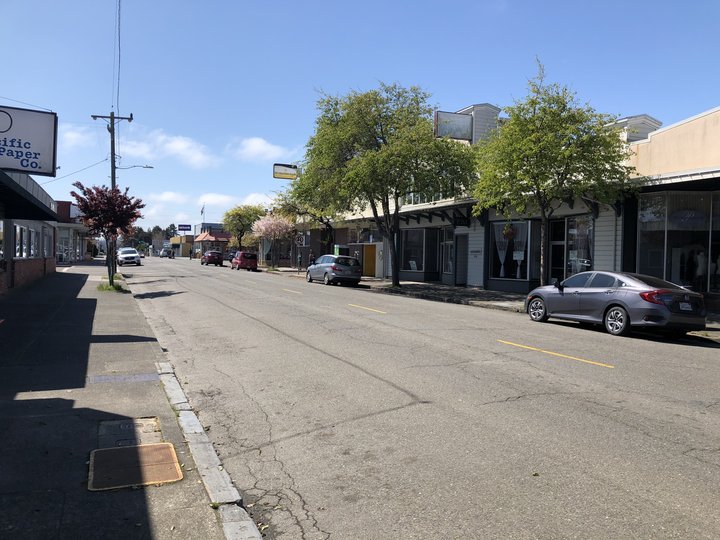
Eureka’s Henderson Center, usually a bustling business district, was nearly deserted Thursday morning. | Photo by Ryan Burns.
# # #
Humboldt County’s shelter-in-place order has been in effect for more than a month now, and while these extreme precautions have no doubt stunted the spread of COVID-19, as intended, they have also hobbled the economy. Hundreds of local businesses have been forced to lay off employees and close their doors — some permanently.
Officials in the Humboldt County Office of Emergency Services are attempting to track the damage by asking business owners to fill out this COVID-19 Economic Impact Survey. To date, 608 owners have done so, reporting more than $26 million in lost revenue and the elimination of 1,874 permanent jobs. Fifteen local business owners say they’ve shut down for good.

Scott Adair. | Screen shot from a video produced by the County of Humboldt.
Scott Adair, Humboldt County’s director of economic development, said these figures capture just a fraction of the full picture. There are thousands of active businesses countywide. He and his staff believe the survey results to date represent only about 43 percent of the actual jobs lost and an even smaller share of the lost revenue.
“Yeah, the situation is pretty serious,” he told the Outpost in a phone interview this week. “It’s critical, actually. We don’t want to downplay the severity. But we also don’t want to gloss over the positives happening in the economy.”
That’s partly because the way we think and talk about the economy has real-world impacts, he said. A negative narrative can be as damaging as the initial injury. “It’s the stories that we tell,” Adair said. “That’s why we have measures for consumer confidence.” Hopelessness, in other words, can be a self-fulfilling prophecy.
“That’s why COVID really threatens more than life and the economy,” Adair said. “COVID also threatens our culture and our livelihood and our spirit. Economies can rebound; businesses can be restarted. But it takes a healthy and stable community to do that.”
Adair argued that even in the midst of this shutdown, there are signs of health and stability in the Humboldt community. As an example, he pointed to the local businesses and organizations that quickly transitioned from their typical roles to meet our emergency needs: Distilleries, head shops and gyms began producing hand sanitizer; community members banded together to sew face masks; College of the Redwoods 3D-printed face shields; businesses have been 3D-printing components for ventilators, etc.
“The innovation and collaboration from the community is incredible,” Adair said.
Such stories are inspiring, even if they can’t quite remedy the financial losses that local businesses are suffering. Experts say this country’s financial recovery is likely to be long and difficult. But local efforts are under way to support businesses during the shutdown and give them a coordinated jumpstart once the economy reopens.
County officials helped establish the COVID Economic Resilience Committee (CERC), a team that includes economic development partners such as the Redwood Region Economic Development Commission (RREDC), the Arcata Economic Development Corporation (AEDC), the North Coast Small Business Development Center and the Fortuna Business Improvement District, plus nonprofit agencies and local chambers of commerce.
Leaders from these groups hold conference calls three times a week to discuss the activities they’re working on and ask what areas still need to be addressed.
In conjunction with his regular duties, Adair is working as the private sector coordinator in the county’s Office of Emergency Services, tracking the ongoing economic damage and working with state counterparts and other agencies to develop a framework for economic recovery.
“We’re taking some direction from the governor’s office, but it’s incumbent on us to develop our own community-level measures,” he said.
To that end, the board of directors for the Headwaters Fund has been working with the county, partner agencies and local lenders to develop an emergency loan program that could help local businesses mitigate losses and survive the shutdown.
This initiative will need to be reviewed and approved by the county’s Board of Supervisors before implementation, but the idea is to give businesses a local resource that can fill the gaps in state and federal programs.
“Some of these [state and federal programs] are difficult to manage,” Adair said. “Some businesses are reporting to us that they’re not even getting responses to their applications.”
The Outpost recently reported on some of the frustrations of business owners who’ve tried to take advantage of the Small Business Administration’s Paycheck Protection Program. On Thursday morning, that $349 billion program officially ran out of money. Congress is working to increase funding, but as of Friday lawmakers had yet to reach a deal.
“We’re also working with the [Humboldt County] Department of Health and Human Services to incrementally reopen businesses,” Adair said. The time for that hasn’t arrived yet, he noted, but county staff is exploring ways to “allow for more trade and commerce while still protecting the public from further spread of contagion.”
Another potential bright spot on the economic horizon is Nordic Aquafarms’ $400 million land-based aquaculture facility, slated for the former pulp mill property on the Samoa Peninsula.
Reached by phone in Maine, where the company is pursuing a similar facility as an East Coast hub, Nordic Executive Vice President Marianne Naess said, “Our plans are still strong for Humboldt. We’re as enthusiastic as we’ve always been.”
Shelter-in-place orders have slowed down the company’s planning and permitting processes somewhat, but Naess said staff is still working. They recently hired a new West Coast project manager to work in the company’s Eureka office — a Humboldt State University graduate named Scott Thompson. And the company is even considering increasing the planned size of the local facility.
“Our goal is still to submit permit applications sometime this fall,” Naess said. “Nothing has closed down; we’re still working. But everything takes longer. … As soon as things open up and are safe to travel, we’ll have more people on the ground in Eureka.”
The company’s local liaison, independent project manager Lynette Mullen, has been enlisted through fellow client RREDC to work with the COVID Economic Resilience Committee. She predicted that it will take at least a year for the local economy to recover, but she said the Nordic project is already providing employment. Local engineering firms have been working on it, and environmental studies will soon be initiated are under way.
“As they move into construction, that will create a number of jobs,” Mullen said. “Ultimately, Nordic is looking to hire probably 100 people.” Given the hardships of this sudden shutdown, some Humboldt residents will no doubt be looking for work and may need to develop new skills. Mullen said Nordic could provide such opportunities.
Meanwhile, Adair said other businesses, including a wood pellet manufacturer and biofuel companies, remain interested in opening facilities on the peninsula.
After highlighting a few of these causes for optimism, Adair returned to the subject of our collective mental wellbeing, suggesting that this partial shutdown of our society has impacts beyond the financial.
“‘Going out’ — shopping, eating at restaurants — is more than just an exchange of currency for goods and services,” he said. “We’re a social species. Many of us are introverts, but as a whole, we like to congregate. There’s an emotional nourishment to going out in public. Right now we’re deprived of that.”
Just as depression can sap an individual’s initiative, it can also suck the energy from a community. And while preventative health care measures rightly take priority for the time being, Adair said we shouldn’t dismiss economic concerns as mere selfishness or greed.
“We have to find this balance,” he said, “protect from the spread of contagion, but the economy has a life to it. We need to take measures to sustain that life as well.”
# # #
Local business owners who have yet to take the county’s COVID Economic Impact Survey can find a link, along with a range of business resources, by clicking here.
# # #
Note: This post has been updated to clarify that Mullen’s role with CERC is unrelated to her role as Nordic’s community liaison.
CLICK TO MANAGE